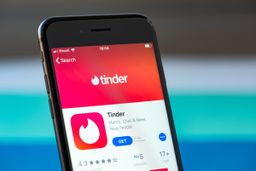when tinder launched in 2012, its creators didn’t give it much thought. A couple of months of idea and work. They went all in as they had nothing to lose: they were young, a small group, and the idea sounded good. The result could not have been more influential on a whole generation of young people.
“We put together what would end up being Tinder in about six to eight weeks and launched it.“, explained Jonathan Badeen, one of the co-founders of Tinder and inventor of the slide. Also known as a swipe among the experts.
The swipe (that slide to one side to say you liked the person, and to the other side to say you didn’t like it) was Tinder’s secret weapon: It seems obvious now, but a decade ago, the swipe transformed mobile dating by turning it into a game of sorts.
the slip it was fun and compulsive, keeping users on the app for hours on end. It released dopamine, a brain chemical that produces a feeling of pleasure that Dinesh Moorjani, another Tinder co-founder, said kept users hooked on the platform.
A dating app that looked like a casino
“We had some users who were using the app 30-40 times a day“, he said surprised the co-founder of the dating app. And who in his right mind would enter an app 40 times a day to search for partner? Tinder has become a kind of game, Russian roulette.
“You can go into a kind of burrow and stay there for hours. You may even miss out on a party because you’re stuck in that loop.e,” adds Natasha Schüll, an anthropologist at New York University who studies game technology and design.
This expert says that Tinder has the same gaming qualities as slot machinesand users fall into the same type of endless gaming loops that she observed among players in Las Vegas.
But, Does the swipe lead to love? This is the big unanswered question that always revolves around the app. There are people who have found their stable partner on Tinder. But many other people only use it as Russian roulette for boys and girls to meet… and forget.

Millions of matches… how many happy couples?
In 2014, Tinder reported that it had made over 2 billion matches, but that doesn’t mean 2 billion happy relationships. And while Tinder’s business model has been a success — it’s consistently one of the top-grossing apps year after year — its effect on users isn’t so clear.
For many users, using Tinder is almost an addiction. There are always new people to meet, potential boyfriends and girlfriends… why be with a person if in an app I have millions of attractive people who surely want to meet you… and this only generates doubts about the users.
Now no data has been given on what percentage of Tinder couples have moved on, lasting more than a few months. What is true is that the app gamifies the process of finding a partner, and this can only be a heavy burden for the relationship.
If you get a prize playing an app, are you going to keep the first prize you get or are you going to want to keep playing? Tinder’s highly addictive foundation has changed the app landscape forever. You have to gamify everything, even the application that is used to see the weather. There is a before and after of Tinder.











![[Img #74692]](https://thelatestnews.world/wp-content/uploads/2024/12/What-do-11-and-12-year-old-boys-and-girls-300x200.jpg)
